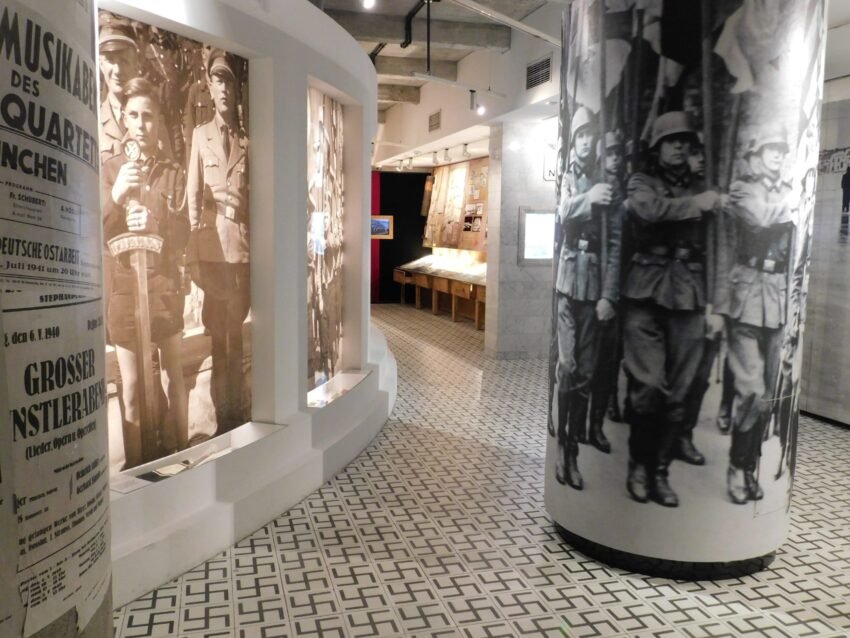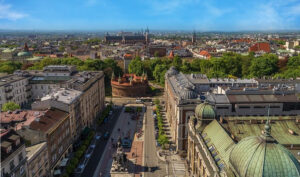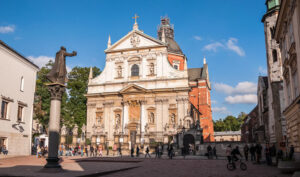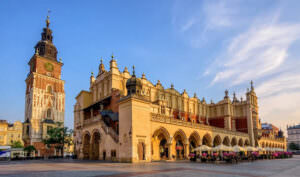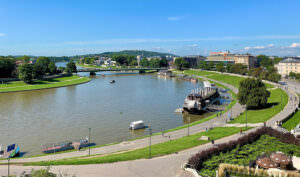When you visit Krakow, the former Oskar Schindler’s Enamel Factory is a must destination to visit, as stands as one of Krakow’s most profound historical attractions, transforming from a wartime lifeline into a world class museum that chronicles the city’s darkest and most heroic chapter. Located in the Zabłocie district, this remarkable site offers visitors an immersive journey through Krakow’s experience during Nazi occupation while honoring the extraordinary story of Oskar Schindler and the 1,200 Jews he saved.
What Is Schindler’s Factory Today?
Schindler’s Factory now houses two distinct museums within its historic walls:
The Historical Museum of Krakow occupies the former administrative building at ul. Lipowa 4, presenting the comprehensive exhibition “Krakow Under Nazi Occupation 1939-1945.” This is what most visitors know as “Schindler’s Factory Museum.”
MOCAK (Museum of Contemporary Art in Krakow) utilizes the former factory workshops, creating an intriguing juxtaposition between historical memory and modern artistic expression.
The museum complex brilliantly preserves the industrial architecture while creating spaces that serve both as memorial and educational center, making it one of Poland’s most visited historical attractions.
The Historical Significance of Schindler’s Factory
Pre-War Origins
The factory was established in 1937 by three Jewish entrepreneurs: Michał Gutman, Izrael Kahn, and Wolf Luzer Glajtman. Originally producing enamelware, the facility represented the thriving Jewish business community that was integral to Krakow’s pre-war economy.
Oskar Schindler’s Takeover
When Nazi Germany occupied Poland in 1939, Oskar Schindler, a German industrialist and member of the Nazi Party, took over the factory. What began as a business opportunity evolved into one of history’s most remarkable rescue operations.
The Rescue Operation
Schindler employed over 1,000 Jewish workers in his Deutsche Emailwarenfabrik (German Enamelware Factory), protecting them from deportation to concentration camps by classifying them as essential workers. His famous “list”, immortalized in Thomas Keneally’s novel “Schindler’s Ark” and Steven Spielberg’s film “Schindler’s List”, saved approximately 1,200 lives.
Post-War History
After the war, the buildings served various industrial purposes. From 1948 to 2002, Krakowskie Zakłady Elektroniczne Unitra-Telpod used the facility for telecommunications equipment production. The transformation into a museum began in the early 2000s, with the historical museum opening in 2010.
The Museum Experience: “Krakow Under Nazi Occupation 1939-1945”
Immersive Exhibition Design
The museum’s permanent exhibition spans 45 meticulously recreated rooms, each representing specific locations and moments from wartime Krakow. Visitors walk through:
- Pre-war Krakow streets with authentic signage and storefronts
- A recreated hairdresser’s salon showing daily life before the occupation
- The Krakow Ghetto with authentic artifacts and survivor testimonies
- Labor camp barracks demonstrating the harsh conditions
- Schindler’s original office with his desk and personal items
- Underground hiding places where Jews sought refuge
- A railway station representing deportation routes
Interactive Elements
The exhibition incorporates cutting-edge museum technology:
- Interactive screens providing detailed historical context
- Audio testimonies from Holocaust survivors
- Kaiserpanorama/Fotoplastikon showing historical photographs
- Reconstructed tram representing wartime transportation
- Authentic artifacts including personal belongings, documents, and photographs
Educational Value
The museum serves as both memorial and educational center, presenting complex historical events in an accessible format. The exhibition doesn’t shy away from difficult topics while maintaining respect for victims and survivors.
What Makes This Museum Special?
Authentic Setting
Unlike many Holocaust museums housed in purpose built facilities, Schindler’s Factory maintains its authentic industrial atmosphere. Visitors walk through the actual spaces where these historical events unfolded.
Comprehensive Narrative
The exhibition extends beyond Schindler’s story to encompass the broader experience of Krakow during Nazi occupation, including:
- The destruction of Jewish communities
- Polish resistance efforts
- Daily life under occupation
- Liberation and aftermath
Innovative Presentation
The museum’s room-by-room approach creates an immersive experience that engages visitors emotionally while providing historical education. Each space tells a specific part of the larger story.
International Recognition
The museum has received numerous awards for its innovative approach to presenting difficult historical material and serves as a model for other memorial sites worldwide.
Combining Your Visit with Other Krakow Attractions
Nearby Historical Sites
- Ghetto Heroes Square (Plac Bohaterów Getta): Just steps away, featuring the powerful memorial chairs commemorating the former ghetto
- Pharmacy Under the Eagle: Another branch of the Historical Museum focusing on Polish assistance to Jews
- Podgórze District: Explore the former ghetto area with remaining fragments of the ghetto wall
Extended Historical Tours
Many visitors combine Schindler’s Factory with:
Auschwitz-Birkenau Memorial Day trip (1.5 hours from Krakow)
Kazimierz Jewish Quarter Walking distance, featuring synagogues and Jewish cultural sites
Wieliczka Salt Mine Another UNESCO site showcasing different aspects of Polish history
Transportation Connections
The museum’s location in Zabłocie provides easy access to other Krakow districts via the efficient tram system.
Tips for Your Visit
Best Times to Visit
- Weekday mornings: Fewer crowds, more contemplative atmosphere
- Off-season (November-March): Reduced visitor numbers but shorter opening hours
- Avoid weekends and holidays: Can be extremely crowded
What to Expect
- Emotional content: The exhibition deals with difficult historical material
- Physical demands: Significant walking and standing required
- Security measures: Bag checks and metal detectors at entrance
- Multilingual support: Excellent English-language materials and audio guides
The Broader Context: Why This Museum Matters
Schindler’s Factory Museum serves multiple crucial functions in contemporary Krakow and Poland:
Historical Education
The museum provides essential education about the Holocaust and World War II, particularly for younger generations who may have limited knowledge of these events.
Memorial Function
It honors both the victims of Nazi persecution and those who risked their lives to help others, preserving their memory for future generations.
Cultural Bridge
The museum helps visitors understand the complex multicultural history of Krakow and Poland, highlighting the significant Jewish contribution to the city’s development.
International Understanding
By presenting history in an accessible, engaging format, the museum promotes international dialogue about human rights, tolerance, and the consequences of prejudice.
A Must Visit Krakow Experience
Schindler’s Factory Museum stands as one of Krakow’s most important and moving attractions, offering visitors a profound encounter with history that extends far beyond tourism. The museum’s innovative approach to presenting difficult historical material, combined with its authentic setting and comprehensive narrative, creates an experience that educates, commemorates, and inspires.
Whether you’re interested in World War II history, Holocaust education, or understanding Krakow’s complex past, this museum provides essential context for appreciating the city’s remarkable journey from tragedy to renewal. The story of Oskar Schindler and the Jews he saved represents hope and humanity in the darkest of times, making this museum not just a historical site but a testament to the power of individual courage and moral choice.
Plan your visit carefully, allow sufficient time for reflection, and prepare for an experience that will deepen your understanding of both Krakow’s history and the broader human experience during one of history’s most challenging periods.

